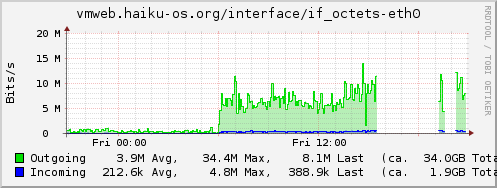Before writing a full RMLL 2013 report on the way home, I just wanted to say that I mentionned Haiku in a question about hardware specifications at the European Parliament on tuesday during a JURI commission workshop : http://www.europarl.europa.eu/ep-live/fr/committees/video?event=20130709-1530-COMMITTEE-JURI (it’s at the end, 2nd question after the 2nd panel)
We’re getting famous ;-)
Last week Olivier and I had the difficult task of handling the booth at RMLL and showing off Haiku in the land of gruyère, chocolate and banks.
As I'm returning from DC-2011 in the train I noticed that I didn't blog for quite some time, and never told you about things I've seen and done at various places this year. Let's fix this mistake ASAP.
This morning I was welcome by a nice XKCD cartoon mentioning Haiku (as an experimental OS).
Several of us started twitting (rather, identi.ca-ing) about it, proud as we were.
Then when getting back tonight we noticed the website was unreachable.
It really seems like it brought us quite a lot of unwaranted advertising! It’s quite visible on the server stats:

BeGeistert is nearly on us, with the long awaited return of the ColaCoder™, and of course I must be there.
I didn’t commit much recently since I started doing a Ph.D and it’s, well, time consuming, so left Axel and Ingo alone in the race.
I won’t be able to attend the coding sprint as well this time, but because I’ll attend the EuroSys 2010 conference (a really highly ranked research event about computers), and I’ll have the honor of doing a demo about Haiku at the poster session (my poster was selected in the best 5 btw), and of course I had to get googlefs working again to show it.
I'm in the TGV back to Valence on wednesday, which luckily has many power plugs, unlike the Thalys which has wifi but no plug for those battery-drained guys like me. It's 21:30 as I start writing this. Will take some more days to finish though...
Not there yet
But first things first, after attending a meeting on Friday in Grenoble, I headed back to Valence to leave some stuff there, then back to the train station, where my train got delayed by an hour or so. But the other frenchies I was to share a car with were also a bit late, so they didn't have to wait for me too much. We then took the road to Düsseldorf and started to talk about each others work, and GSoC since we had two of the students on board.
Here is my own report about what happened at FOSDEM. Actually so many things went on I probably missed some.
Getting there
For this second time at FOSDEM, I tried to get a shared devroom with other projects, but there were so many requests we only had a booth. We probably wouldn't have had enough material alone for two days anyway. Besides, manning a booth itself is already quite demanding.
Last week I received a mail telling me MSI wanted to hear from me what I wanted on their next products on their forum. Frankly, I didn’t even remember having an account on that forum, where I registered to help someone on a BeOS SMP question. So I jumped in and started telling what I, as an Haiku developer, really expected from a hardware manufacturer, trying to explain, with humour but determination, why open hardware is so important to me.
Then after some other’s post I replied a second time, first to someone mentioning the need for HDMI support on why I didn’t agree because of DRM, then a maybe-rantful-but-oh-so-true digression about the availability of specifications. Sadly, neither post are available for your reading pleasure, a moderator found them to be “rubbish” and removed them altogether, who obviously doesn’t use alternative Operating Systems, never wrote a driver with only uncommented Linux code as reference, doesn’t live in France, and never saw a TV set manual from before 1980.
Since my views weren’t welcome there, I’ll try to at least make them clear here, and either MSI (and other vendors) read them or not, but I’m used to the latter anyway. Please note that was the act of a moderator, which might or might not be part of MSI, nor reflect their own policy (I wish).
As the m68k port is getting shape, maybe some of you want to give a hand, so here is how to set up the environment. After explaining the choice of the target platform we’ll start with the build system, then the emulator to debug on the chosen platform.
Unlike BeOS, our kernel includes some pieces of C++ code, which sometimes give a headache when it comes making sense of a stack crawl from the kernel debugger, since symbols are mangled when linked into binaries, which means we must Decode__12CrypticCNamesPCc. I recalled seeing some gcc4 private API to demangle symbols into human-friendly names, but the code doing that, from libsupc++, has been written without concern for the inhabitants of the Kernel Debugging Land, using calls to malloc, realloc and free... But I still wanted to get nicer names, so I didn't give up. I also wanted to be able to get assembler dumps since not everyone has a serial cable to make use of the gdb stub.





